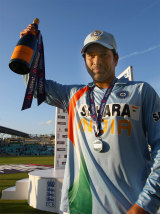Will Twenty20 wreck cricket?
The success of Twenty20 begs the question: what effect will it end up having on the traditional formats? Ashok Malik looks for some answers
Ashok Malik
23-Sep-2007
|
|

|
With a cocktail of energy, adrenalin and high TRPs, the World Twenty20 is already a success. Commentators and cricket buffs are labelling it the future. There is a certitude here that was absent, for instance, when predictions for the one-day format were made at the 1975 Prudential Cup.
Yet, Twenty20 is not a standard innovation - if any innovation can be called standard in
the first place - that will merely expand the market for cricket. In both its time of arrival and in the plans the ICC has for it, Twenty20 could be the monster that gobbles up the competition.
The first ODI was played in 1971 but the limited-overs game, with coloured clothing, white balls and the rest of the razzmatazz, came into its own in the 1980s. A century after the first Test, cricket was ready for a new format. Especially in the subcontinent, where the dull predictability of Test matches on dead wickets - does anybody remember a one-season wonder called Taslim Arif hitting 210 against Dennis Lillee in 1980? - made the shorter game seem exciting and endorsement-friendly.
One-day cricket didn't eat into Test cricket; it simply filled up vast empty spaces in the calendar. The number of Test matches played today as opposed to in, say, 1987, has not gone down. It's just that the time between Tests has been packed with a glut of 50-over matches.
Twenty20 is a different animal. If it is to become the third international - and the word is used literally, to mean matches between countries or full members of the ICC - version of cricket, it will inexorably end up cannibalising the senior formats. No year has 500 days. No year has enough time for a full complement of Test, ODI and Twenty20 matches.
In the 1980s Test cricket was seen as a sunset industry, and so ODIs were welcomed. In 2007 the situation is decidedly different. In important markets - the Indian subcontinent, Australia - ODI cricket is still a lucrative business. As such, officials are wary of Twenty20 and want to control its growth. To use an analogy, a cabal of VCD manufacturers has been given the job of developing a business plan for DVDs.
This dilemma is best exemplified at the BCCI. It has, expectedly, influenced the ICC as well. What, then, do the gnomes of cricket have in mind?
|
|
The Premier League approach
The announcement of the Indian Premier League (IPL) has been interpreted as an answer to the rebel Indian Cricket League (ICL). The IPL model, which is going to be replicated in Pakistan a year later and slowly expand to all major ICC countries, is however more than just that. It is also an attempt to "bottle up" Twenty20, to release it in calibrated doses.
The announcement of the Indian Premier League (IPL) has been interpreted as an answer to the rebel Indian Cricket League (ICL). The IPL model, which is going to be replicated in Pakistan a year later and slowly expand to all major ICC countries, is however more than just that. It is also an attempt to "bottle up" Twenty20, to release it in calibrated doses.
The ICC is keen to promote Twenty20 in domestic cricket, perhaps with new teams and franchises, rather than have it compete with Test matches and ODIs. There is, doubtless, a conundrum here. Given the response to the current World Twenty20, the format's future is assured. More importantly, given its scheduling advantage, Twenty20 is more likely to win acceptance into the Olympics or the Asian Games than cricket's marathon formats.
If one goes by the IPL system, the BCCI - or the cricket board in the individual country - will sell eight franchises, essentially allowing cricket entrepreneurs to set up eight "clubs". These clubs/franchises can then sign on any first-class cricketer playing in India or overseas.
With $3 million in prize money in its first year, and with corporate houses expected to bankroll the franchises, money should not be a problem for the IPL. Even so, how will teams/franchises develop themselves as brands and command fan loyalty? Are the eight franchises going to be artificial constructs or is there going to be a geographical basis?
Take an example. If a team called Kingfisher Tigers signs up Brian Lara, Glenn McGrath and Sachin Tendulkar, it will be a very strong cricket side and draw attention. Yet, in a sense, it will be an ersatz team, a revved-up Rest of India XI for an Irani Trophy game.
Now if Kingfisher Tigers was actually Kingfisher Bangalore Tigers, and if it were to include Lara, McGrath, Rahul Dravid and four other senior Karnataka players, it would begin with a captive supporter base. This constituency is important. If a franchise is to become a viable entity, it will need to survive arrivals and departures of specific players and stars; it will have to sell merchandise and memorabilia, feed fans at team-themed restaurants. From Manchester United to the Los Angeles Lakers, successful sports brands/clubs everywhere have been underpinned by specific population- or regional affiliations.
Yet there is a twist here as well. Can Tendulkar play in the Ranji Trophy for Mumbai and two weeks later in the IPL for Kingfisher Bangalore Tigers? Where would his loyalty lie? How would Mumbai and Bangalore cricket fans perceive him? Which set would have a sense of ownership?
One or the other
The traditional domestic game - Ranji Trophy, Duleep Trophy and so on - is going to have to compete with the IPL for talent, money, crowds and television deals. It is obvious which format is going to win. Twenty20 is the money-spinner in England, not four-day county matches played on cold, windswept mornings. There is no reason why the Indian cricket market will not follow the same logic.
The traditional domestic game - Ranji Trophy, Duleep Trophy and so on - is going to have to compete with the IPL for talent, money, crowds and television deals. It is obvious which format is going to win. Twenty20 is the money-spinner in England, not four-day county matches played on cold, windswept mornings. There is no reason why the Indian cricket market will not follow the same logic.
First-class cricket will still be played, of course, but it will become even more of an obscure phenomenon than the Ranji Trophy currently is. Sooner or later this will require the young cricketer to exercise a choice. Over the past 20 years it has been possible for top cricketers to excel at both Test and ODI cricket. To expect them to straddle three formats - ranging from Twenty20 to classical Test cricket - is to perhaps expect too much.
|
|

|
Michel Platini and Zinedine Zidane were probably the greatest footballers to play
for France. Eric Cantona doesn't figure in the calculation; he holds a French
passport but won fame and fortune at Manchester United. Is Twenty20 going to create
cricket's Cantonas?
The paradox at the top
Any sport needs a food chain. Age-group tournaments, college and university championships and local club leagues throw up talent for national teams. Cricket could soon end up with a strange paradox. As the IPL and its sisters make Twenty20 the format of choice at the domestic level, can the ICC continue to insist on Test and ODI cricket as mainstay formats at the international level?
Any sport needs a food chain. Age-group tournaments, college and university championships and local club leagues throw up talent for national teams. Cricket could soon end up with a strange paradox. As the IPL and its sisters make Twenty20 the format of choice at the domestic level, can the ICC continue to insist on Test and ODI cricket as mainstay formats at the international level?
If the prototypical young cricketer is happy signing up for clubs/franchises in the
IPL and in other leagues, and making his money there, is he going to bother playing
five-day cricket? Today the India cap has no competition. When a plethora of clubs
is ready to sign you on, pay you well and build your profile, is it worth it trying
to catch the eye of the BCCI's zonal selector?
What will this do to cricket's food chain? A batsman brought up on Twenty20 at home
cannot suddenly be asked to bat out 50 overs and save a Test on the fifth afternoon.
Will this contradiction inevitably force the ICC to institutionalise Twenty20 as the
leading international version of the game? What will it do to Test and ODI cricket? I don't know the answer, but the question scares me.
Ashok Malik is a writer based in New Delhi